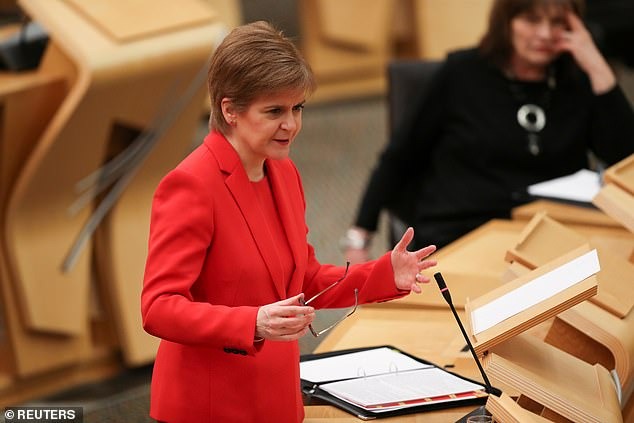NICOLA STURGEON’S Scottish Government has suffered a major blow in its hopes to rejoin the EU, as its fiscal deficit soars.
New data from the Institute for Fiscal Studies (IFS) will be released this week, showing in 2020-21 the gap between public spending and tax revenues has risen to 22 to 25 percent of Scotland’s gross domestic product. It comes as a blow to the SNP’s hopes to rejoin the EU, as the deficit has hit eight times the acceptable limit set by the bloc, which is 3 percent of GDP. The EU has suspended its fiscal rules during the pandemic.
The IFS said the rise in GDP in cash terms represents a deficit of more than £40 billion.
Scotland’s gap is nearly three times the level of the Scottish deficit the year before, with 2019-20’s levels at 8.6 percent.
It is also higher than the UK deficit of 14.5 percent for the last year.
Scotland’s deficit marks a peacetime record-high, and is in part due to high public spending due to coronavirus and a fall in revenues accrued by North Sea oil.
Murdo Fraser, the Scottish Conservative finance spokesman, responded to the figures published in The Times.
He said the SNP would struggle to join the EU and added: “Nicola Sturgeon . . . cannot answer basic questions about the finances of an independent Scotland — and on this evidence, no wonder.”
The spokesman also suggested the IFS figures laid bare “the bleak reality of the chasm between tax revenues and public spending.
Mr Fraser then told the outlet: “Future generations would face an impoverished future — while arrogant SNP politicians would be just fine.
“Not only do the SNP have no credible currency plan, but they also have no obvious route to join the EU and on the basis of these numbers, it looks highly implausible.”
Mairi Spowage, interim director at the Fraser of Allander Institute at Strathclyde University, also told the outlet it “would not be possible to run structural deficits of this scale over the long run” for Scotland.
John McLaren, a former Scottish government economist, added: “One of the big changes since 2014 has been the virtual disappearance of North Sea revenues that an independent Scotland might expect to have available.
“This means that Scotland’s underlying fiscal deficit is less erratic but also, Covid aside, unsustainably high.”
The SNP, however, said “every country in the world is dealing with exceptional public finance pressures as we recover from the pandemic”, and said the party wants to ensure Scotland has “all the powers needed to manage our own recovery”.
t comes ahead of the May 6 Scottish elections, where the SNP are predicted to win.
A recent Survation poll shows the SNP are set to win 67 seats, a majority of five MSPs, in Holyrood.
Carried out from April 20 to April 22, and surveying 1,037 people over 16 in Scotland, it showed the SNP on 50 percent in the constituency vote and on 35 percent in the regional vote.
Scottish Labour is on 21 percent and 22 percent, but the Tories are set for 21 percent and 20 percent.
Source: express.co.uk

